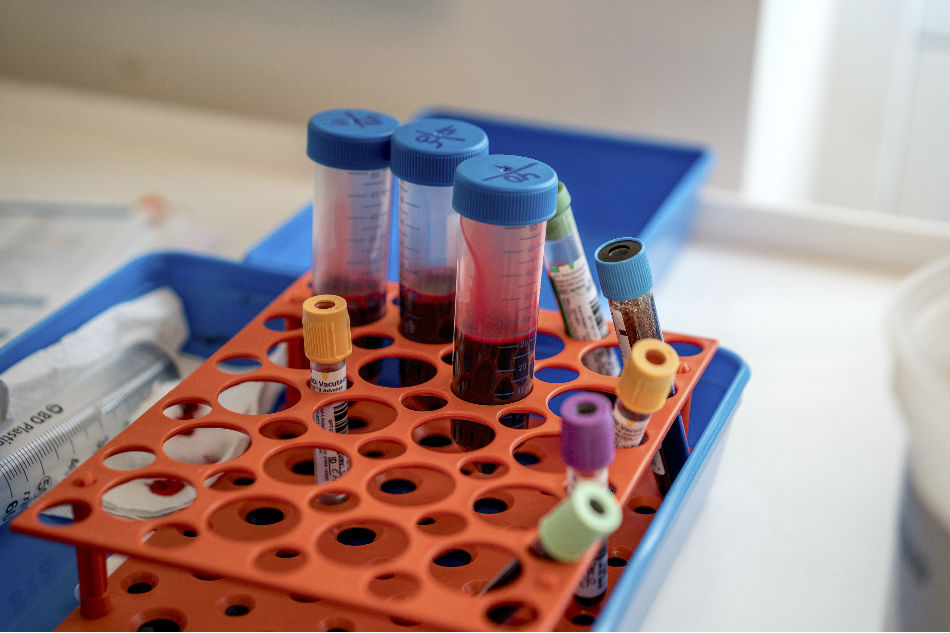COVID-19 risk doesn’t depend (much) on blood type, new studies find | ABS-CBN
ADVERTISEMENT

Welcome, Kapamilya! We use cookies to improve your browsing experience. Continuing to use this site means you agree to our use of cookies. Tell me more!
COVID-19 risk doesn’t depend (much) on blood type, new studies find
COVID-19 risk doesn’t depend (much) on blood type, new studies find
Carl Zimmer,
The New York Times
Published Jul 16, 2020 08:32 AM PHT
Early in the COVID-19 pandemic, researchers found preliminary evidence suggesting that people’s blood type might be an important risk factor — both for being infected by the virus and for falling dangerously ill.
Early in the COVID-19 pandemic, researchers found preliminary evidence suggesting that people’s blood type might be an important risk factor — both for being infected by the virus and for falling dangerously ill.
But over the past few months, after looking at thousands of additional patients with COVID-19, scientists are reporting a much weaker link to blood type.
But over the past few months, after looking at thousands of additional patients with COVID-19, scientists are reporting a much weaker link to blood type.
Two studies — one at the Massachusetts General Hospital and the other at Columbia Presbyterian Hospital in New York — did not find that Type A blood increases the odds that people will be infected with COVID-19.
Two studies — one at the Massachusetts General Hospital and the other at Columbia Presbyterian Hospital in New York — did not find that Type A blood increases the odds that people will be infected with COVID-19.
The new reports do find evidence that people with Type O blood may be slightly less likely to be infected. But the effect is so small that people shouldn’t count on it. “No one should think they’re protected,” said Nicholas Tatonetti, a data scientist at Columbia University.
The new reports do find evidence that people with Type O blood may be slightly less likely to be infected. But the effect is so small that people shouldn’t count on it. “No one should think they’re protected,” said Nicholas Tatonetti, a data scientist at Columbia University.
ADVERTISEMENT
Reviewing medical records for 7,770 people who tested positive for the coronavirus, Tatonetti and a graduate student, Michael Zietz, found that people with Type A blood were at a somewhat lower risk of being placed on ventilators. People who were Type AB were at a higher risk, but the scientists cautioned that this result might not be reliable because there were so few patients with that blood type in their analysis.
Reviewing medical records for 7,770 people who tested positive for the coronavirus, Tatonetti and a graduate student, Michael Zietz, found that people with Type A blood were at a somewhat lower risk of being placed on ventilators. People who were Type AB were at a higher risk, but the scientists cautioned that this result might not be reliable because there were so few patients with that blood type in their analysis.
Tatonetti and Zietz released the initial results from 1,559 patients at Columbia Presbyterian Hospital in April. Their larger survey is now under review for publication in a scientific journal.
Tatonetti and Zietz released the initial results from 1,559 patients at Columbia Presbyterian Hospital in April. Their larger survey is now under review for publication in a scientific journal.
The other new study, carried out at Massachusetts General Hospital, offers a somewhat different picture. The researchers also found that people with Type O were slightly less likely to get COVID-19. But blood type did not affect whether people would have to be placed on ventilators, or their odds of dying.
The other new study, carried out at Massachusetts General Hospital, offers a somewhat different picture. The researchers also found that people with Type O were slightly less likely to get COVID-19. But blood type did not affect whether people would have to be placed on ventilators, or their odds of dying.
Anahita Dua, a vascular surgeon at the hospital and the senior author of the study, said that blood type was not something she’d consider when judging the risks faced by patients who tested positive for COVID-19. “I wouldn’t even bring it up,” she said.
Anahita Dua, a vascular surgeon at the hospital and the senior author of the study, said that blood type was not something she’d consider when judging the risks faced by patients who tested positive for COVID-19. “I wouldn’t even bring it up,” she said.
“With this new paper, it’s probably decided that blood groups are not influencing the outcome of the disease,” said Joern Bullerdiek, the director of the Institute for Medical Genetics at University Medicine Rostock in Germany.
“With this new paper, it’s probably decided that blood groups are not influencing the outcome of the disease,” said Joern Bullerdiek, the director of the Institute for Medical Genetics at University Medicine Rostock in Germany.
c.2020 The New York Times Company
c.2020 The New York Times Company
Read More:
The New York Times
ANC
blood type
coronavirus
coronavirus research
COVID-19
coronavirus updates
COVID-19 updates
coronavirus latest
COVID-19 latest
ADVERTISEMENT
ADVERTISEMENT


